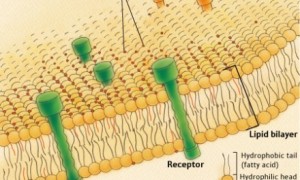We have been taught to consume complex carbohydrates, adequate protein, lots of fruits and vegetables, antioxidants, and daily vitamins and minerals. We have also been taught to consume low fat foods. However, good nutrition is about balanced consumption of over 50 nutrients, and that too tailored to demographic factors like age, gender and diet type. Lipids or fats we consume are the most sensitive nutrients both because of their own properties and because they come in sources such as oils, butters, nuts and seeds packed with micronutrients that can change the metabolism of lipids and are sensitive nutrients in themselves. Some of these micronutrients are rarely the focus of diet plans, e.g. phytochemicals, yet such micronutrients have a very narrow window of healthful effects.

Cell Membrane with lipid bilayer
Lipids are the building blocks of life. They yield twice the amount of energy as carbohydrates and proteins and are crucial cell membrane components, gene regulators and precursors of hormones and other bioactive compounds. Lipids affect a broad range of physiological functions including respiration, vision, digestion, musculoskeletal function, mood, mental function, immunity, sleep, and reproduction.
Lipids include monounsaturated fatty acids (MUFA), polyunsaturated fatty acids (PUFA), saturated fatty acids (SFA), sterols, and fat-soluble vitamins including vitamins A, D, E and K.
- MUFA are found in natural foods such as red meat, whole milk products, nuts and high fat fruits such as olives and avocados. Olive oil is about 75% MUFA.
- PUFA include omega-6 and omega-3, which are considered essential fatty acids because they have critical physiological functions but the body cannot make them. PUFA are found in nuts, seeds, fish, algae, and leafy greens.
- SFA are found in animal fats such as cream, cheese, butter, tallow, lard, coconut oil, palm kernel oil, and chocolate.
Lipids constitute 20-40% of calories but are associated with 80% of health problems and the related social burden. There has been a major debate in scientific community on low fat versus high fat, and good fats versus bad fats for over last four decades, but the answers are complex. It is not so much which fat, but how much, and in what context (
total fat consumption on health and fatty acid metabolism). Antioxidants, phytochemicals, and hormones (
gender differences in nutritional needs) can change the metabolism and requirements of fats. Not only that these micronutrients can be harmful in excess. Therefore, consuming portions of lipids and micronutrients tailored to diet types (
diet type differences in nutritional needs) is important.

Antioxidants are vitamins, minerals and enzymes that protect the body from the formation of free radicals. Research indicates that free radical damage may be the basis for the aging process. Although antioxidants are considered healthy, a balance of different antioxidants is required, and excessive amounts of antioxidants can be harmful. They can selectively enhance activity and availability of long-chain omega-3 in-vivo; but also inhibit the activity and availability of long-chain omega-6. See the Antioxidant Section of our Scientific Publications page.
 Phytochemicals or Phytonutrients
Phytochemicals or Phytonutrients (phytosterols, flavonoids, resveratrol, melatonin, lutein, zeaxanthin, and carotenoids) can accumulate and affect cell membrane structure and processes, gene expression and inflammation. They can have both antioxidant and oxidant properties depending on levels of consumption. They can selectively enhance activity and availability of long-chain omega-3s in-vivo; but also can inhibit the activity and availability of long-chain omega-6. See
Phytochemical Section of our Scientific Publications section.
Our solution to this complexity is
LipiLife, which provides lipids and micronutrients tailored to diet type, and demographic factors. In addition we provide
Low-lipid Complements designed to complement
LipiLife to keep you in the safe range of nutrients.

 Phytochemicals or Phytonutrients (phytosterols, flavonoids, resveratrol, melatonin, lutein, zeaxanthin, and carotenoids) can accumulate and affect cell membrane structure and processes, gene expression and inflammation. They can have both antioxidant and oxidant properties depending on levels of consumption. They can selectively enhance activity and availability of long-chain omega-3s in-vivo; but also can inhibit the activity and availability of long-chain omega-6. See Phytochemical Section of our Scientific Publications section.
Phytochemicals or Phytonutrients (phytosterols, flavonoids, resveratrol, melatonin, lutein, zeaxanthin, and carotenoids) can accumulate and affect cell membrane structure and processes, gene expression and inflammation. They can have both antioxidant and oxidant properties depending on levels of consumption. They can selectively enhance activity and availability of long-chain omega-3s in-vivo; but also can inhibit the activity and availability of long-chain omega-6. See Phytochemical Section of our Scientific Publications section.